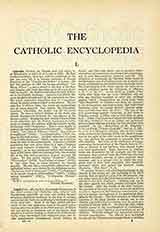

French poet and critic, b. at Montbrison in 1812; d. at Lyons in 1883. He first studied medicine, then law, and was admitted to the bar, but soon left it to become professor of French literature at the “Facultt des lettres” of Lyons. He lost this position in 1863 for having published “Les Muses d’Etat”, a satire aimed at the men of the Second Empire, and from that time on he devoted all his time to poetry. In 1858 he had taken the seat of Musset in the French Academy. Laprade is probably the most idealistic French poet of the nineteenth century. His talent somewhat resembles that of Lamartine, whom he gladly acknowledged as his master. His inspiration is always lofty, his verses are harmonious and at times graceful. God, nature, the fatherland, mankind, friendship, the family are his favorite topics. To form a correct opinion of his work, one should discriminate between the two phases of his literary career. During the first, which extends down to his admission into the French Academy, he takes pains to connect the ancient with the modern world, mythology with Christianity. This is what might be termed the impersonal phase of his thought. “Psyche” (1842), “Les Odes et Poemes” (1844), “Les Poemes evangeliques” (1852). “Les Symphonies” (1855), belong to this first period. Another collection of poems “Les Idylles heroiques” (1858), marks the transition from the first to the second phase. Laprade’s poetical pantheism has now given place to a more Christian and more humane inspiration. The “poet of the summits”, as he was sometimes called, had become a man of his times; filial and parental love, the country life of his dear native province (Forez), are now his topics. To this period belong “Pernette” (1878), “Harmodius” (1870), “Les Poemes civiques” (1873). It was then that, in some measure, he became popular. He was also a remarkable educational and aesthetical writer, as is shown by the following works: “Questions d’art et de morale” (1867), “Le Sentiment de la nature avant le christianisme” (1867), “L’education homicide” (1867), “L’education liberale” (1873).
PIERRE MARIQUE

